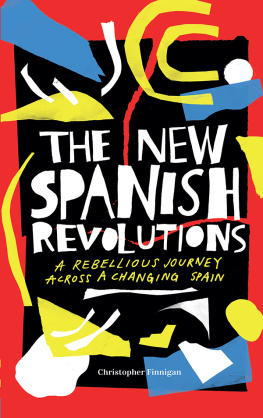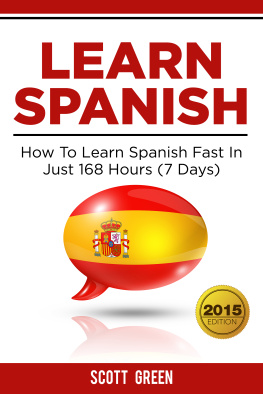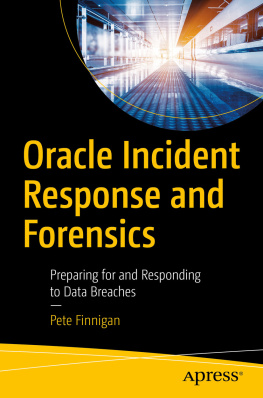ABOUT THE AUTHOR
Christopher Finnigan worked for three years as a freelance journalist in Barcelona, during which time he wrote for the magazine Barcelona Metropolitan and blogged for El Pas s English website. His work has also appeared in the Guardian , New Statesman and the Independent .
NEW SPANISH
REVOLUTIONS
A REBELLIOUS
JOURNEY ACROSS
A CHANGING SPAIN
CHRISTOPHER
FINNIGAN
New Spanish Revolutions: A rebellious journey across a changing Spain was first published in 2020 by Zed Books Ltd, The Foundry, 17 Oval Way, London SE11 5RR, UK.
www.zedbooks.net
Copyright Christopher Finnigan, 2020
The right of Christopher Finnigan to be identified as the author of this work has been asserted by him in accordance with the Copyright, Designs and Patents Act 1988.
Typeset in Haarlemmer by seagulls.net
Index by Sally Osborn
Cover illustration and design by Steve Marsden
Printed and bound by CPI Group (UK) Ltd, Croydon, CR0 4YY
All rights reserved. No part of this publication may be reproduced, stored in a retrieval system or transmitted in any form or by any means, electronic, mechanical, photocopying or otherwise, without the prior permission of Zed Books Ltd.
A catalogue record for this book is available from the British Library
ISBN 978-1-78699-709-8 hb
ISBN 978-1-78699-483-7 pb
ISBN 978-1-78699-484-4 pdf
ISBN 978-1-78699-485-1 epub
ISBN 978-1-78699-486-8 mobi
For my parents and Meela
CONTENTS
This book simply wouldnt exist if it wasnt for the kindness and support of such a large number of people. Many of them welcomed me into their homes, some into their lives. They have generously shared their stories and experiences with me and Im grateful to all of them.
Thank you to Ken Barlow for not only seeing potential in my proposal but for having the vision to expand its focus. I was extremely lucky to have a supportive and patient editor at Zed Books in Kim Walker, and while James Attlee came to the project late, his instincts for the manuscript allowed it to gain a balance previously missing. The depth of his historical knowledge was crucial to several passages and his sense of the bigger picture invaluable.
Ive been fortunate enough to receive generous advice from many people at different times. In particular, thank you to Owen Jones for his guidance on the industry and the first steps a writer must take. Thank you also to Dan Hancox for providing some essential writing advice early on.
To all my friends, who, while they may not know, have provided inspiration, support and advice from beginning to end. There are too many to mention here but those I must thank are: Cristian Aldariz, Mireia Bongard and her wonderful family, Andrew Gilbert, Teresa Tiburcio and Oriol Dotras. Nicky Armstrong, Martin Kelly, Jonathan Sherry, Edgar Iglesias Vidal and Laura Lorenzi and so many others from Barcelona who helped shape my understanding of events across Spain. Im especially grateful to Dorian Martinez and James Hunt for their friendship.
My family have been such help through the researching and writing of this book. My siblings have provided words of encouragement and sympathy when I needed them most. If it wasnt for the support of my dad, Kevin Finnigan, I wouldnt even be able to think about putting pen to paper. My mum, Lynne Finnigan, has been a constant source of reassurance. Thank you both for your love and unfailing confidence in me, no matter what. And, of course, Meela. I cant express how grateful I am for all the love and support you have given me. I owe you more than you ever will know.
I
In May 2013, when I was twenty-five years old, I moved from London to Barcelona. My girlfriend joined me two months later and in August of that year we moved into a tiny apartment in a six-storey building on a busy road in the centre of the city. Downstairs was a Galician fish restaurant, opposite us a school, and on the corner a bakery and supermarket. The roads four lanes pointed to the beach, and taxis, motorbikes and delivery trucks thundered down it day and night, rattling the thin glass of our old, second-floor windows.
Late one afternoon during the first week in the apartment the noise of the traffic stopped. The silence was quickly replaced by another sound, at first seemingly far away but suddenly as deafening as the roar of the traffic. I went to the window and looked down: two police cars, blue and red lights flashing, were crawling up the road; behind them followed unbroken rows of people carrying placards and banners, marching in step to the beat of a drum somewhere in the middle of a crowd so enormous that the hot tarmac had disappeared beneath their feet. The marchers repeated the words thrown out with a metallic echo by a megaphone at the back. The streets stone walls amplified every word, reflecting them forwards and up into the kitchen.
It was from this apartment in the centre of Barcelona that I heard a new sound of the city, a sound that revealed the anger, discontentment and deep desire for political change in a country that, between 2010 and 2020, experienced two of the biggest political crises it has faced since its return to democracy in 1977: the breaking of the two-party system system, at first from pressure from the radical left, later from the far right, and the attempted break away of Catalonia from Spain. That sound from the street below was at first a novelty and soon became as reliable and as frequent as the one-way traffic. It was then that I discovered that our apartment was located not just on a busy road, but on one of several of the citys official routes for political protest. On weekday afternoons and late weekend mornings for the next twelve months I came face to face with the huge numbers of people expressing their public opposition to corruption cases, to the refusal for Catalans to be granted a referendum, to proposed changes to abortion law, to public sector cuts, to the continued legacy of General Franco, to fascism, to evictions, to unemployment and much more.
But I hadnt just moved to a city of engaged, active, politicised citizens; I had moved to a country full of them. In 2016, two academics from the University of Salamanca studied the data on demonstrations around Europe and concluded that the propensity to participate in street protest activities is much higher in Spain than in other European countries. According to their data,unemployment and income. In 2006, the percentage of people who participated in a demonstration was higher in Spain than in Germany, France, Portugal or Switzerland.
In 2012 and 2013 the number of protests in Spain reached a staggering 45,000, meaning that 25 per cent of the population had participated in at least one demonstration that year. The huge number of protests occurring were, of course, not limited to the ones we saw from our window in Barcelona. In the capital city of Madrid in 2013 there were 4,500 registered demonstrations around twelve demonstrations per day. To compare that figure with another European country say, with the one I had just left the same research data revealed that there were just ninety-two recorded demonstrations that year.
Trade unions organised around half of all these demonstrations. Spain has three major unions that all have deep, historic roots across the country. They are unions that have organised armies for war, clandestine resistance to dictatorship and strikes against the expansion of neoliberalism. But organised labour alone didnt plan the thousands of other demonstrations across Spain. These were coordinated by groups unaffiliated with this more traditional form of political activism. Free from institutional traditions and arrangements, they emerged from local neighbourhoods, plazas and squares across Spain, some in the form of neighbourhood associations, others as single-issue campaign groups or collectives. Defined loosely as social and grassroots movements, they enabled people across Spain to make sure that their voices were heard outside the traditional established structures. Their presence would be so powerful that their activism would set the countrys political agenda for the coming years. Spain, the Salamancan academics concluded, is nothing less than a country of street protesters.







![Ken Finnigan [Ken Finnigan] - Enterprise Java Microservices](/uploads/posts/book/119364/thumbs/ken-finnigan-ken-finnigan-enterprise-java.jpg)

